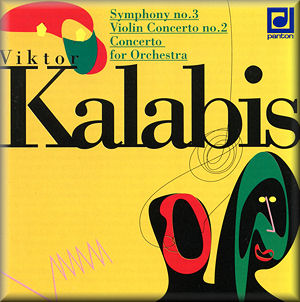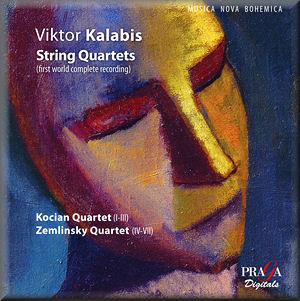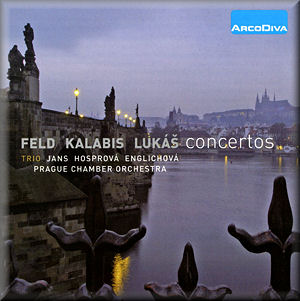 |
 |
| 
Can
anyone help with a supplier for this disc?
Otherwise pester Amazon about this
link |
Viktor KALABIS (1923-2006)
Symphony No. 3 for large orchestra, Op. 33 (1970-71) [24:36]
Violin Concerto No. 2, Op. 49 in one movement (1977-78) [15:16]
Concerto for Large Orchestra, Op. 25 (1965-66) [28:29]
 Prague Radio Symphony Orchestra/Jirí Belohlávek (Op. 33); Josef
Suk (violin), Czech Philharmonic Orchestra/Wolfgang Sawallisch (Op.
49); Czech Philharmonic Orchestra/Ladislav Slovák (Op. 25)
Prague Radio Symphony Orchestra/Jirí Belohlávek (Op. 33); Josef
Suk (violin), Czech Philharmonic Orchestra/Wolfgang Sawallisch (Op.
49); Czech Philharmonic Orchestra/Ladislav Slovák (Op. 25)
rec. Dvorák Hall, Rudolfinum, Prague, 1972; 1980, live; 1971
 PANTON 81 9027-2 011 [68:39]
PANTON 81 9027-2 011 [68:39] |
| 

alternatively
CD: MDT
AmazonUK
AmazonUS
|
Viktor KALABIS
(1923-2006)
CD 1
String Quartet No. 1, Op. 6 (1949) [25:20]
String Quartet No. 2, Op. 19 (1962) [15:32]
String Quartet No. 3, Op. 48 (1977) [17:55]
CD 2
String Quartet No. 4 “Tribute to J.S.Bach”, in one movement, Op.
62 (1983-4) [11:56]
String Quartet No. 5 In memory of Marc Chagall, Op. 63 (1984) [19:59]
String Quartet No. 6 In memory of Bohuslav Martinu, Op. 68 (1987-8)
[16:37]
String Quartet No. 7 Op.76 in one movement (1993) [14:24]
 Kocian Quartet (Pavel Hula, Miloš Cerný (violins), Zbynek Padourek,
(viola) Václav Bernášek (cello)) (1-3); Zemlinsky Quartet (František
Soucek, Petr Strlžek (violins), Petr Holman (viola), Vladimír Fortin
(cello)) (4-7)
Kocian Quartet (Pavel Hula, Miloš Cerný (violins), Zbynek Padourek,
(viola) Václav Bernášek (cello)) (1-3); Zemlinsky Quartet (František
Soucek, Petr Strlžek (violins), Petr Holman (viola), Vladimír Fortin
(cello)) (4-7)
rec. CD1: Domovina Studio, Prague 1, 20-21 July 2009; CD2: Prague,
June 2009
Musica Nova Bohemica series
World premiere recording of complete Kalabis string quartets
 PRAGA DIGITALS PRD/DSD 250262 [58:58 + 63:16]
PRAGA DIGITALS PRD/DSD 250262 [58:58 + 63:16]  |
| 
Buy
through MusicWeb
for £12 postage paid World-wide.
Musicweb
Purchase button |
Jindrich FELD (b.1925)
Sonata for flute and string orchestra (1957 for flute and piano;
arranged for flute and orchestra 1965) [19:47]; Musique concertante
for flute, viola, harp and strings (2005) [19:57]
Zdenek LUKÁŠ
(b.1928) Music for Harp and Strings [15:58]
Viktor KALABIS (1923-2006) Tristium
- Concert Phantasy for viola and strings (1981) [12:11]
 Carlo Jans (flute); Jitka Hosprová (viola); Katerina Englichová
(harp)
Carlo Jans (flute); Jitka Hosprová (viola); Katerina Englichová
(harp)
Prague Chamber Orchestra/Antonín Hradil
rec. Domovina Studios, Prague, September 2006
 ARCO DIVA UP 0097 - 2 131 [68:20]
ARCO DIVA UP 0097 - 2 131 [68:20]  |
| |
THREE KALABIS CDs
I wrote about Viktor Kalabis earlier this year (2010) and was
delighted that the Kalabis
and Ruzickova Foundation sent me three further volumes to
listen to and write about.
PANTON 81 9027-2 011
The Panton release contains three concise orchestral works by
one of the Czech Republic’s most illustrious composers. The
symphony (one of five), which dates from 1971, is said to be
linked to the aftermath of the Prague Spring. With its migration
through blanched colours and desolate yet never quite frozen
landscapes via a saw-toothed Allegro molto drammatico (it could
have been more dramatic, I think) and a shiftingly pensive and
mournfully introspective Adagio offering little consolation.
The Second Violin Concerto (one of eleven concertos for various
instruments) is a tautly constructed and concentrated work written
for the soloist here. It has a fruity redolence of the Berg
Concerto with an infusion of violence. It here receives a virile
and at times raging performance and recording. The four movement
Concerto for Orchestra is the earliest work here and ranges
through a seemingly scorched landscape, through inventive plangent
writing, through honeyed consolation (at the end of II) and
impudent fluttering fugal writing. Its two companions feel more
focused and driven. The Concerto for Orchestra is a display
piece operating as a vehicle for the instruments of the orchestra
- not in any stultifying academic way – and also as a kaleidoscope
of moods and scenes.
PRAGA DIGITALS PRD/DSD 250262
Like Martinu the composer he promoted for many years Viktor
Kalabis wrote seven string quartets. They appear here in one
Praga Digital set in their Musica Nova Bohemica series after
having initially been issued as separate discs.
These are stunning works in stunning performances.
The First Quartet was commissioned by the famous Smetana
Quartet but never played by them perhaps because at the time
its language was felt to be too elitist. In fact it sings the
same opulently melodic tissue sung by the Smetana quartets.
That said it is filtered through the twentieth century’s tonal
alembic. Those poniard stabs at the opening speak of anger and
tragedy subjected to melancholy softening by the eloquent Elegia-Largo
(III) and the optimistically inclined and folk-inflected
Allegro vivace (IV).
The three movement Second Quartet was commissioned and
premiered by the Vlach. It is more inclined to the searingly
acrid than the First Quartet. The spiky witchery of the central
movement prepares the ground for the acidic yet sweetly fatigued
desolation of the finale. The Third Quartet followed
fourteen years after its predecessor. It is playful though the
play feels macabre like that of medieval plague children. It
was premiered by the Talich in 1980.
The Zemlinsky Quartet take over from the Kocian for the second
disc. The Fourth Quartet was written during the final
days of the Communist regime. Like the First Quartet it was
premiered by the Smetana for its anniversary. And just like
the First the commissioners were slow in playing the work as
a result the premiere was given by the Berlin Comic Opera Quartet.
It is a work of quiet confiding and whispered fantasy. Its successor,
the Fifth Quartet (in memory of one of Kalabis’s influences
the painter Marc Chagall) shares this sense of a world in miniature
across three intricately imagined movements the last of which
has a sanguine motor rhythmic drive and buzzing and wheeling
gypsy feeling that in its high wheeling violin writing recalls
Tippett. The Sixth Quartet is dedicated to Martinu, a
composer in whose music he invested much time including active
promotion and assistance in founding the Martinu Institute.
This work feels bigger and louder in sound – more dramatic –
in keeping with Martinu’s own muse though never sounding like
a parody. That said there are some Martinu echoes as in the
buzzing at the start of the finale which for me recalls the
Fantaisies Symphonique. The second CD starts and ends
with a single movement quartet. The Seventh Quartet contains
for me the frankest Martinu reference at about 3:00 in. It is
said to be a biographical work and the composer described it
as ‘… a diary, a confession …’. It feels intimate and the note-writer
for this set, Ales Brezina draws a plausible comparison with
the Beethoven late quartets. The music is vividly imagined and
some of it certainly communicates as a soliloquy if that is
not a contradiction in terms. A fine skein of stratospheric
violin writing impresses in an enigmatically majestic yet telling
piece of understatement.
ARCO DIVA UP 0097 - 2 131
Jonathan
Woolf wrote with typically incisive sympathy abut this disc
some three years ago. It now reappears with a new cover; Jonathan
had been critical of the old one. Feld’s Musique concertante
is mightily delicate, alive with thrumming energy and occasionally
dissonantly edgy but nothing to frighten your auntie’s horses.
It’s a wirily imaginative blend of Stravinsky, Martinu and Tippett.
If you have been pleased to discover the Mexican composer Julian
Orbón either through the various Mata recordings or on Naxos
then this should please you. Feld’s Sonata for flute and
string orchestra is less thorny than its companion here.
The middle movement’s velvet mallet blows recall Martinu and
the whole effect is seriously enchanting as is the fluttering
bustle of the finale - Allegro Vivace. Lukas’s Music
for Harp and Strings is tonal-melodic with drama present
but subordinate to romantic surrealism. Again if you have enjoyed
William Alwyn’s Lyra Angelica then this is a footstep
away and just as beautiful, as dignified and, as a harp concerto,
as exciting. Kalabis’s Tristium is about the same length
and is of a similar scale and emotional demeanour to Holst’s
Lyric Movement though perhaps more varied in the range
of incidents. The four works represent a melodious slice of
the last century’s finest musical invention.
Rob Barnett
Other MWI Kalabis reviews
Arco Diva
http://www.musicweb-international.com/classrev/2007/Jan07/Feld_UP0097.htm
MSR set
http://www.musicweb-international.com/classrev/2010/Sept10/Kalabis_MS1350.htm
Supraphon http://www.musicweb-international.com/classrev/2003/Aug03/Kalabis.htm
|
|




 All Nimbus reviews
All Nimbus reviews








